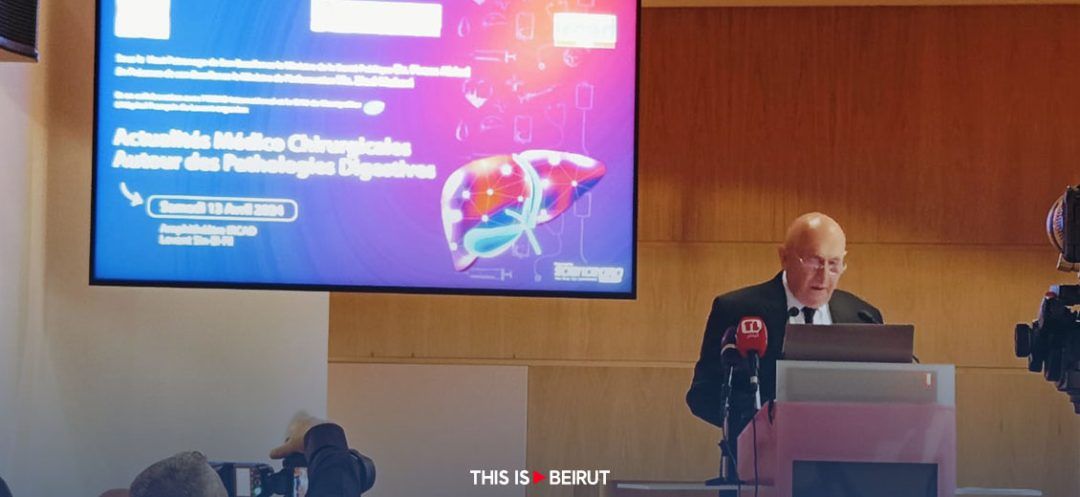
At the forefront of medical progress, the IRCAD conference in Lebanon, in collaboration with the Montpellier University Hospital, explored the latest medical and surgical advances in the field of digestive pathologies.
On Saturday, the French Hospital of the Levant organized a day focusing on medical and surgical updates, in collaboration with IRCAD International (Research Institute Against Digestive Cancers) and the Montpellier University Hospital, under the patronage of Caretaker Minister of Public Health Firas Abiad. Several personalities attended the opening ceremony, notably Caretaker Minister of Information Ziad Makari.
At the Origins of IRCAD
In the heart of Alsace, amidst the cobblestone streets and half-timbered houses of Strasbourg, Professor Jacques Marescaux, a French physician and hospital surgeon, founded the Institute for Research Against Digestive Cancers in 1994.
Swiftly becoming a point of reference in minimally invasive surgery and a world leader in surgical robotics, IRCAD wasted no time in opening branches in several countries, notably in the United States, Taiwan, Brazil, Lebanon, China, and Rwanda.
In an interview with This is Beirut, before the start of the conference on Saturday, Dr. Antoine Maalouf, CEO of the French Hospital of the Levant (which is twinned with the Montpellier University Hospital), explained at the very outset that “the efficiency of the Lebanese medical system was a key factor in the decision of IRCAD's founder to choose the Lebanese capital as the site for its fifth center.”
“At a medical congress held in Beirut in 2018, Professor Marescaux designated Lebanon as the site for IRCAD's regional center for the Middle East. He favored the simplicity and effectiveness of the Lebanese medical system over the financial resources of Gulf countries,” Dr. Maalouf said.
“It was a wonderful reward for the hard work and dedication of Dr. Elie Abboud (former hospital practitioner in Narbonne and former MP of Herault), alongside my own,” adds Dr. Maalouf. “IRCAD established itself in Lebanon in January 2019, just months before the popular uprising of October 17.” “At that time, we had to make our way through the demonstrators who had blocked the roads to deliver the robot and equipment to the hospital,” he recalls.
In his speech at the inaugural session, Dr. Maalouf insisted on the relationships with his French counterparts. He then gave the floor to Minister Makari, who assured that “serious efforts were exerted to restore Lebanon’s position on the map of regional medical tourism.”
A video featuring Jacques Marescaux (who had a last-minute commitment) was then broadcasted, during which he traced IRCAD's evolution worldwide. Professor Marescaux further underscored IRCAD's role, stating its objective of integrating computerized technologies within the same operating room. This integration, he said, is geared towards bolstering the safety, efficiency, and precision of surgical procedures. This technical revolution enhances the surgeon’s performance, from improving visibility during surgeries, all the way to refining the precision of hand movements during medical procedures.
Liver Transplantation, Tumors, Hepatobiliary Surgery, and AI
Speakers then presented advances in various surgical fields. Professor Francis Navarro, Chief of Service at the Montpellier University Hospital and head of the Digestive Surgery B and Transplantation Department, was the first to address the audience. Renowned in both Europe and globally, he also leads the medical team specializing in hepatic, biliary, pancreatic surgery, and transplantation. Quite impressive!
In a flawlessly delivered presentation, he explored crucial topics, including liver transplantation from living donors, providing a glimmer of hope for Lebanese patients. An interactive discussion and a question-and-answer session followed between Lebanese physicians and the speaker.
Thereafter, Professor Ibrahim Dagher, a French-Lebanese visceral and digestive surgeon, addressed the minimally invasive hepatobiliary surgery which holds the promise of providing new perspectives in the domain of modern surgical approaches.
Dr. Isabelle Raingeard proceeded to discuss advancements in the diagnosis and treatment of sporadic pancreatic endocrine tumors before passing on the baton to Professor Laurent Palazzo. The latter then presented the latest developments in utilizing endoscopic ultrasound for managing pancreatic cystic tumors.
The conference ended on a futuristic note with a presentation by Professor Joe Abou Jaoudeh on the contribution of artificial intelligence to diagnosing digestive diseases.
The Future of Digestive Surgery
The history of medicine in Lebanon dates back thousands of years, originating from the ancient civilizations that once inhabited the region. The Phoenicians, famed for their maritime ingeniousness, bequeathed a remarkable medical heritage, establishing advanced healthcare systems and sophisticated medical practices. This tradition of excellence in medical care persists today, cementing Lebanon's status as a center for medical research and innovation. The success of this day was further proof of this.
As a genuine bastion of medical innovation, IRCAD is shaping the future of global digestive surgery through its seven centers. Lebanon stands at the forefront, and maintains its position. Despite attempts to obstruct its progress, Lebanon remains firmly rooted in the region, continuing to shine as a lighthouse in the Middle East.
That is indeed his rightful role.
Read more




Comments